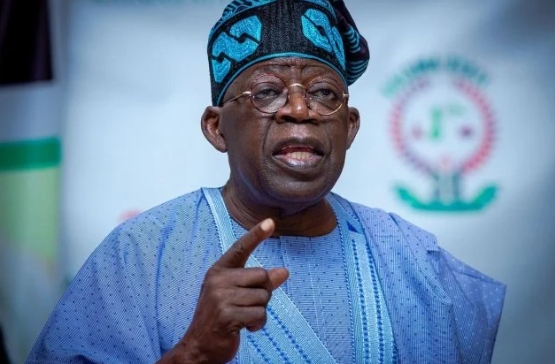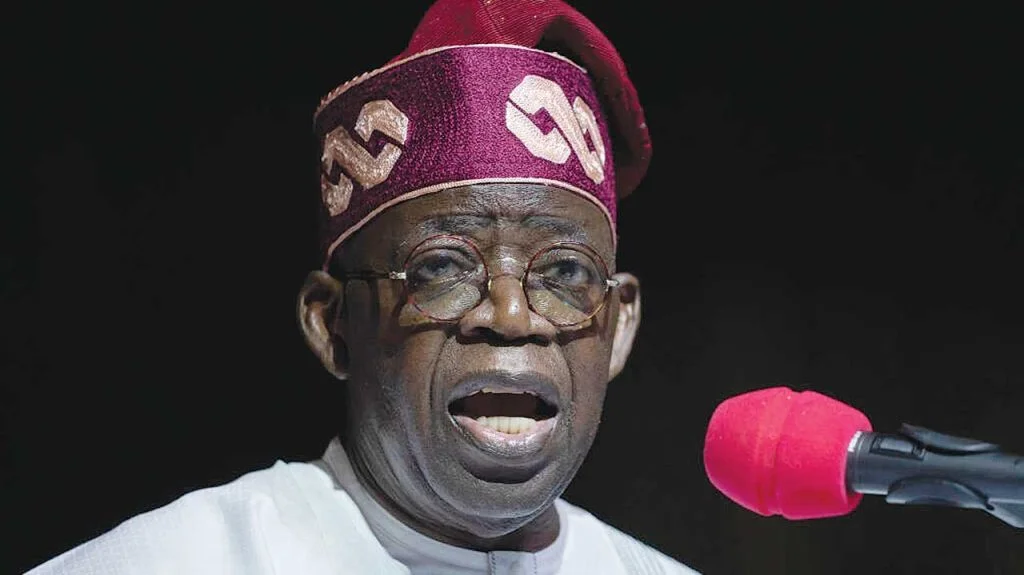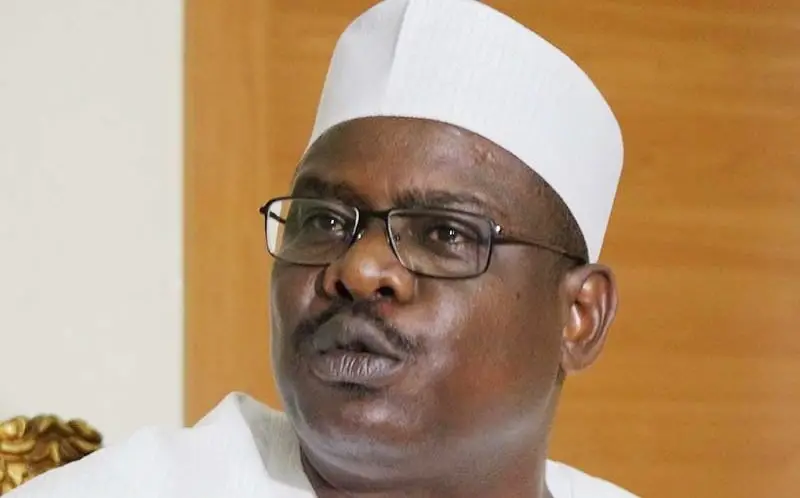Politics
APC Primary: How Govs, NWC, Others Gave Tinubu Victory

After months of high-wire politicking, alignment and counter-alignment, National Leader of the All Progressives Congress, APC, and former governor of Lagos State, Asiwaju Bola Ahmed Tinubu, yesterday, won the party’s 2023 presidential ticket in style.
He polled 1,271 delegates’ votes, which is more than the 831 combined total of his 13 other opponents at the two-day primaries held at Eagle Square, Abuja.
His closest rival, the former Transportation Minister, Mr Chibuike Rotimi Amaechi, garnered 316 votes; Vice President Yemi Osinbajo polled 235 votes; and Senate President, Ahmad Lawan, got 152 votes.
Vanguard had earlier repeatedly reported that the contest would be a three-horse race featuring Tinubu, Amaechi and Osinbajo.
Although the party said it had 2,322 delegates, only 2,203 were physically on the ground and accredited for the exercise. Of the figure, 13 votes were invalid.
Co-chair of the Election Management Committee, Pastor Osagie Ize-Iyamu, announced the results.
Details of votes polled by other aspirants are Governor Yahaya Bello of Kogi State, 47 votes; Governor Dave Umahi of Ebonyi State, 38; Governor Ben Ayade of Cross River State, 37 votes; Senator Sani Yerima, four votes; Dr Ogbonnaya Onu, one vote; and Chief Emeka Nwajiuba, one vote.
The other aspirants — Pastor Tunde Bakare, Senator Rochas Okorocha, Tein Jack-Rich, and Chief Mokelu Ikeobasi had zero votes each.
Chairman of the Election Management Committee, Governor Abubakar Atiku Bagudu, who was the chief returning officer, returned Tinubu as validly-elected to fly the party’s presidential flag in next year’s general election.
With his victory, Tinubu has been handed APC’s political arsenal to face Alhaji Atiku Abubakar of Peoples Democratic Party, PDP; and Mr Peter Obi of the Labour Party, LP, among other opponents in the 2023 presidential poll.
How APC Govs influenced Tinubu’s emergence
Vanguard had in the lead up to the March 26 national convention of the party, reported how the APC governors struck a deal with President Muhammadu Buhari by trading off the national chairmanship position for that of the Presidency.
At the time, the governors were negotiating that one of them be supported by the president to emerge as the standard-bearer of the party.
However, as the Special Convention and Presidential Primary of the APC, drew closer, it became apparent that the president wanted to have a lot of input into who succeeds him. He had begged the governors to allow to him pick his successor.
While negotiations were ongoing, the northern governors’ forum in the APC resolved that power must shift to the South, essentially trying to force the president to support a Southern aspirant, following speculations that the president wanted Senate President Ahmad Lawan.
Efforts by the National Chairman of the party, Senator Abdullahi Adamu to impose Lawan on stakeholders as the adopted consensus aspirant were, however, resisted especially by the Northern Governors who were later joined by their Southern counterparts within the party.
READ ALSO: APC Primary: Tinubu Coasts To Victory, Scores Over 50% Votes
For about five days before the primary, the governors engaged in a series of stakeholder meetings. The Northern governors met with political stakeholders from the region and then later met with President Buhari to demand a power shift to the South.
They, thereafter, stormed the national secretariat of the party on Monday night to meet with the Adamu-led National Working Committee NWC. But after about an hour of waiting and Adamu was nowhere to be found, they filed out to the Presidential Villa area where the national chairman lives.
The governors were said to have conveyed their position to their representatives in the NWC and Abdullahi Adamu himself. They also guided their delegates on the need to vote for Tinubu.
At the convention, delegates of virtually all the governors, except four, voted for Tinubu. The four governors include Dave Umahi of Ebonyi State who participated in the primary; with his delegates voting for him; a North Central and South Western state governors and Yahaya Bello of Kogi State, who also participated in the primary
Factors, horse trading that gave Tinubu victory
Indeed, Tinubu’s margin of victory is large but it did not come easy. It was a product of 30 years of political association with stakeholders across the country; weeks of energy-sapping negotiations to get opponents to lay down their weapons; and several days of wooing entrenched interests in the party to his side.
Some of the battles he fought include getting APC power brokers in the North to back power shift to the South; wooing delegates across the country including “unfriendly” states; stopping moves to use consensus to decide the candidate; and eventually the conduct of the primaries.
Said to enjoy the backing of many presidential aspirants who bought the APC N100 million expression of interest and nomination forms, sources said Tinubu got political and traditional leaders in the South-West to prevail on aspirants from the zone to step down for him.
The series of meetings and negotiations continued even at the convention ground. It led to four of the seven South-West aspirants and three aspirants from the other zones to back down.
The yeoman’s job was done by 13 Northern APC governors, some Southern governors and members of the National Working Committee, who first fought against moves to make Senate President Lawan the consensus candidate; and later delivered their states’ votes for Tinubu at the convention.
READ ALSO: 2023: We Must Keep PDP Out Of Power – Tinubu
On Monday, the eve of the primaries, the National Chairman, Adamu, told members of the NWC that Lawan had become the consensus candidate for the primaries on Tuesday. Members of the NWC kicked against the move and insisted that other aspirants must take part in the primaries. The news filtered to 13 of the 14 APC governors in the North, who stormed Aso Villa to meet with President Buhari and insisted on a power shift to the South.
Thereafter, President Buhari, the governors, and members of the NWC disowned Senator Adamu over Lawan and the stance paved the way for all the 23 aspirants to contest Tuesday’s primaries.
Signs of Tinubu’s victory
Signs that Tinubu would win the contest emerged early when many delegates from many states wore Tinubu-branded clothes and sang praises of the former Lagos governor all through the event.
Things became clearer when aspirant after aspirant started stepping down for Tinubu. In all, seven aspirants did so cutting across South-West, South-East, South-South, and North-West
Those, who stepped down for Tinubu were Governors Kayode Fayemi (Ekiti) and Mohammed Badaru Abubakar (Jigawa); Senator Godswill Akpabio; Professor Roberts Ajayi Borroffice; former House Speaker Dimeji Bankole; Senator Ibikunle Amosun; and Mrs Uju Ken Ohanenye.
VANGUARD.
Politics
Tinubu, Six APC Governors Hold Closed-door Meeting At Aso Villa

President Bola Ahmed Tinubu on Monday met with six governors elected on the platform of the All Progressives Congress (APC) in a closed-door session at the State House, Abuja.
The purpose of the meeting was not immediately disclosed, and details of its agenda remained unclear at press time.
In attendance were governors Umar Namadi (Jigawa), Monday Okpebholo (Edo), Biodun Oyebanji (Ekiti), Usman Ododo (Kogi,) Aliyu Sokoto (Sokoto) and Dr. Nasir Idris (Kebbi), who arrived at the Presidential Villa separately.
The meeting, held in the President’s office, lasted almost two hours.
Although no Presidency official offered insight into the agenda, the consultations come amid rising security concerns across the country and ongoing political engagements within the ruling party.
The governors declined to speak to journalists after the meeting.
READ ALSO:JUST IN: Navy Officer Who Had Altercation With Wike Reportedly Escapes Assassination Attempt
President Tinubu has recently intensified his focus on national security by convening a series of high-level meetings involving key security stakeholders, including the service chiefs of the Army, Navy, and Air Force, as well as intelligence coordinators and senior officials from various security agencies.
This increased engagement comes in response to a worrying upsurge in banditry, kidnappings, and violent crimes that have spread across multiple regions, causing widespread public concern and escalating pressure on the federal government for urgent and effective intervention.
These strategic meetings, frequently conducted in secrecy to ensure confidentiality and candid discussion, have aimed to undertake a comprehensive review of ongoing security operations nationwide.
Discussions have prioritised enhancing coordination and communication among military, police, and intelligence units to foster a more unified and cohesive response to security challenges.
In addition, the sessions have explored innovative and tactical measures that leverage intelligence gathering, rapid deployment, and community engagement to dismantle criminal networks and restore order.
READ ALSO:JUST IN: Tinubu Holds Closed-door Meeting With Rivers, Ebonyi Govs
Throughout these consultations, President Tinubu has underscored that safeguarding the lives and property of Nigerians is paramount.
He has called on the security apparatus to move beyond reactive measures and adopt more preventive, intelligence-driven strategies that anticipate threats before they escalate.
The administration’s renewed approach signals a commitment to reinforcing national security architecture and improving the operational effectiveness of all agencies involved in the fight against crime and insurgency across Nigeria.
In other news, the National Security Adviser (NSA), Nuhu Ribadu, has expressed optimism that the security challenges – terrorism, banditry, kidnapping, and other violent crime – Nigeria has been facing for almost three decades now will be overcome.
READ ALSO:Tinubu Submits Fresh Ambassadorial List To Senate, Ibas, Dambazau Make Cut
The NSA described those behind the “painful and unnecessary” challenges as “evil” and vowed they would be defeated.
Ribadu made remarks during the opening of a one-day dialogue organised by the National Peace Committee, in partnership with the delegation of the European Union to Nigeria and the U.S., on “a whole-of-Society Approach to the Prevention of Violence and Conflict in Northern Nigeria,” on Thursday in Abuja.
“This (security challenges) also shall pass. We are going through tough times. This will also go.
“But it’s very, very painful, what we are going through. It’s unnecessary.
They are very unfair to us, those who are responsible for this. They are evil.
“But they will be defeated. It’s a matter of time, and peace will be restored. That one we can assure you. Because there are people who are working, not necessarily making noise.
“There are people who are making sacrifices. Every single day, we go to bury our own deaths. Painful as it is. But most people don’t talk. Sacrifice is ongoing,” the NSA said.
Politics
JUST IN: Tinubu Holds Closed-door Meeting With Rivers, Ebonyi Govs

President Bola Ahmed Tinubu on Monday held separate closed-door meetings with Rivers State Governor Siminalayi Fubara and Ebonyi State Governor Francis Nwifuru at the State House, Abuja.
The engagements came amid heightened political tension in Rivers State and renewed speculation over Governor Fubara’s future within the Peoples Democratic Party (PDP).
Fubara arrived at the Presidential Villa at about 5:01 p.m. and was received by the Presidential Protocol Liaison Officer before being escorted to the President’s office.
He departed at about 5:45 p.m., but details of the meeting remained undisclosed as of press time.
Shortly before his arrival, Governor Nwifuru had been ushered in for a separate audience with the President. The purpose of his visit was also not revealed.
READ ALSO:Police Arrest Suspect For Raping Woman To Death In Rivers
Nwifuru , a former Speaker of the Ebonyi House of Assembly and now an All Progressives Congress (APC) governor, has in recent months held several engagements with the Presidency, largely centred on infrastructure development and security coordination in the South-East.
Tinubu’s meeting with Fubara follows Friday’s defection of 17 members of the Rivers State House of Assembly, loyal to the Minister of the FCT, Nyesom Wike, and led by Speaker Martin Amaewhule, from the PDP to the APC.
The mass defection has significantly altered power dynamics in the state legislature and heightened uncertainty about Fubara’s political trajectory.
lawmakers believed to be aligned with the governor remain in the PDP, and they have yet to resume their seats since the lifting of the state’s emergency rule on September 18.
READ ALSO:OPINION: Can Tinubu, Our Eddie Kwansa, Now Come Home?
The Guardian earlier reported that President Tinubu met with six APC governors in a closed-door session at the State House, Abuja.
The purpose of the meeting was not immediately disclosed, and details of its agenda remained unclear at press time.
In attendance were governors Umar Namadi (Jigawa), Monday Okpebholo (Edo), Biodun Oyebanji (Ekiti), Usman Ododo (Kogi,) Aliyu Sokoto (Sokoto) and Dr. Nasir Idris (Kebbi), who arrived at the Presidential Villa separately.
The meeting, held in the President’s office, lasted almost two hours.
Although no Presidency official offered insight into the agenda, the consultations come amid rising security concerns across the country and ongoing political engagements within the ruling party.
READ ALSO:(VIDEO) Obasanjo To Tinubu: Why Are We Negotiating With Bandits?
The governors declined to speak to journalists after the meeting.
President Tinubu has recently intensified his focus on national security by convening a series of high-level meetings involving key security stakeholders, including the service chiefs of the Army, Navy, and Air Force, as well as intelligence coordinators and senior officials from various security agencies.
This increased engagement comes in response to a worrying upsurge in banditry, kidnappings, and violent crimes that have spread across multiple regions, causing widespread public concern and escalating pressure on the federal government for urgent and effective intervention.
Politics
Ambassadorial Nominees: Ndume Asks Tinubu To Withdraw List

Ahead of the Senate’s screening and confirmation of the ambassadorial nominees sent to the Red Chamber by the Presidency, former Senate Leader Ali Ndume has appealed to President Bola Tinubu to withdraw the list from parliament.
The federal lawmaker declared that the composition of nominees was in clear breach of the Federal Character principle, as enshrined in the Constitution.
Checks revealed that while certain states have three and four nominees, states like Gombe have no representation, while the only nominee from Yobe, Senator Adamu Garba Talba, died last July.
The entire North East state has 7 nominees in the list.
Further checks revealed that the South West geopolitical zone has 15 nominees, while the North West and South East have 13 and 9, respectively.
READ ALSO:Full List: FG Releases Names Of 68 ambassadorial Nominees Sent To Senate For Confirmation
North Central region has 10 nominees in the list of career and non-career ambassadorial nominees, while South South region has 12 nominees.
The Senate President at plenary on Thursday formally read the list of nominees and referred it to the Senate Committee on Foreign Affairs for further legislative action.
The Senator representing Borno South in a statement issued on Saturday maintained that the list of nominees was in clear breach of Section 14(3) of the Nigerian Constitution which mandates that the composition and conduct of the federal government must reflect the “federal character of Nigeria” to ensure national unity and loyalty.
The section reads: “The composition of the Government of the Federation or any of its agencies and the conduct of its affairs shall be carried out in such a manner as to reflect the federal character of Nigeria and the need to promote national unity, and also to command national loyalty, thereby ensuring that there shall be no predominance of persons from a few State or from a few ethnic or other sectional groups in that Government or in any of its agencies.”
READ ALSO:Tinubu Submits Fresh Ambassadorial List To Senate, Ibas, Dambazau Make Cut
The former Chief Whip of the Senate admonished President Tinubu to avoid taking decision that will fuel ethnic tension and promote distrust in the country, amidst the wrong narrative being promoted by the Western world against his administration.
He said: “My sincere appeal to President Tinubu is to withdraw this list. At this critical time in the life of his administration, he should avoid missteps that could endanger national unity and promote ethnic distrust.
“I know him to be a cosmopolitan leader who is at home with every segment and stakeholders in the country.
“He should withdraw that list and present a fresh set of nominees that will align with the spirit of the Constitution on Federal Character Principle that government’s structure and operations must represent the diverse states and peoples of Nigeria.”

 Metro3 days ago
Metro3 days agoEdo: How Pastor Hypnotised My Daughter, Made Her Abandoned NNPCL- Mother

 News4 days ago
News4 days ago9 Common Resume Mistakes Graduates Make – And How To Avoid Them

 Entertainment4 days ago
Entertainment4 days agoIt Is Getting Out Of Hand – Tuface Cries Out Amid Marital Crisis

 News3 days ago
News3 days agoOba Of Benin Suspends Priest, Reaffirms Appointment Of Okao

 Entertainment4 days ago
Entertainment4 days ago‘We’re Coming To Save You’ – Teni On 2Face’s Distress Call

 News4 days ago
News4 days agoTinubu Submits Fresh Ambassadorial List To Senate, Ibas, Dambazau Make Cut

 Entertainment4 days ago
Entertainment4 days agoMy Marriage Ended Amicably – Comedian Sabinus Confirms Split From Wife

 Metro3 days ago
Metro3 days agoMy Husband Felt Insecure After I Got A Job, Accused Me Of Infidelity —Wife

 News4 days ago
News4 days agoEdo Journalist Hospitalised After Being Attacked By Political Thug

 News4 days ago
News4 days agoTroops Raid Criminal Hideout, Recover Arms In Plateau






























